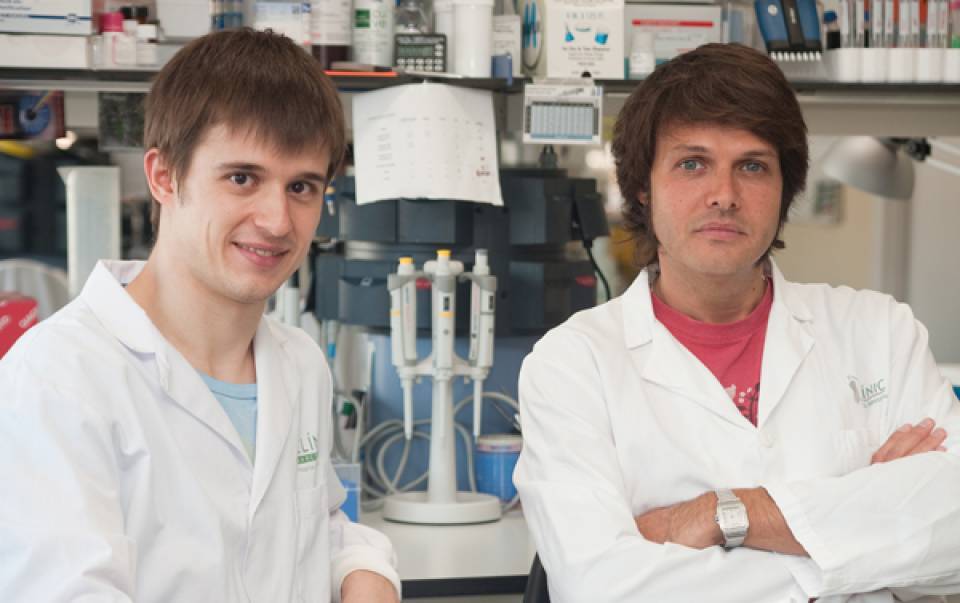A study led by Dr. Marc Claret, Miguel Servet - ISCIII researcher at IDIBAPS, describes the central role of Mitofusin-2 in POMC neurons in this process. The study, with Marc Schneeberger, Predoctoral Researcher (University of Barcelona), as its first author and supported by Obra Social "la Caixa" and ACUP through RecerCaixa, has been selected for the cover of the latest issue of Cell.
Previous works reported that hypothalamic neurons resistant to the effects of leptin, which inhibits the desire to eat food, suffered endoplasmic reticulum stress. The endoplasmic reticulum is a cell organelle responsible, among other duties, for the formation and maturation of proteins encoded in the genome and their distribution inside or outside the cell. When this organelle does not work properly, proteins are not well formed and accumulate interfering some cellular functions. The work led by researchers from IDIBAPS demonstrates how the endoplasmic reticulum stress is preceded by a physical separation between the endoplasmic reticulum and mitochondria.
Mitochondria are a cellular organelle related to energy generation and a focus of interest in researches on pathologies such as hepatic fibrosis or neurodegenerative diseases. Mitochondria are numerous inside cells and are often attached to the endoplasmic reticulum through Mitofusin-2 protein. When the mice investigated in this study consumed a high fat diet, the level of Mitofusin-2 in the POMC neurons decreased. Consequently, the endoplasmic reticulum and mitochondria separated causing stress in the endoplasmic reticulum and the emergence of resistance to the effects of leptin.
To better understand the role of Mitofusin-2 in the development of leptin resistance and obesity, the researchers generated transgenic mice lacking Mitofusin-2 in the POMC neurons. These animals eat more, gain weight due to excessive accumulation of fat and have satiety systems and energy expenditure altered. The cause of these disorders is the presence of stress in the endoplasmic reticulum of the POMC neurons, which prevents the release of a neuropeptide that suppresses appetite. When the stress in the endoplasmic reticulum is reversed through a drug treatment, these changes are normalized and mice recover a normal behaviour.

RecerCaixa is a program to promote excellence in scientific research in Catalonia promoted by the Catalan Public University Association (ACUP) and Obra Social "la Caixa". This initiative was launched in 2010 with a call for research grants, with the intention of promoting the best research projects and research groups working in Catalonia, from both public and private universities and research centers. Since the launch of the program in 2010, Obra Social "la Caixa" has supported 68 research projects with a total investment of 4.6 million euros.
IDIBAPS - Institut d’Investigacions Biomèdiques August Pi i Sunyer - is the biomedical research center formed by the Hospital Clínic of Barcelona, University of Barcelona, the Consejo Superior de Investigaciones Científicas (CSIC) and the Generalitat de Catalunya (Catalan Government). Created in 1996, IDIBAPS is committed to promoting translational research, innovation and technological advancement in the field of biomedicine, through different programs focused on diseases with an important morbidity and mortality in our country.
Article reference:
Marc Schneeberger, Marcelo O Dietrich, David Sebastián, Mónica Imbernón, Carlos Castaño, Ainhoa García, Yaiza Esteban, Alba Gonzalez-Franquesa, Ignacio Castrillón Rodríguez, Analía Bortolozzi, Pablo M Garcia-Roves, Ramon Gomis, Ruben Nogueiras, Tamas L Horvath, Antonio Zorzano and Marc Claret. Mitofusin-2 in POMC neurons connects ER stress with leptin resistance and energy imbalance. Cell, Volume 155, Issue 1, 172-187, 26 September 2013. 10.1016/j.cell.2013.09.003
Read the article

